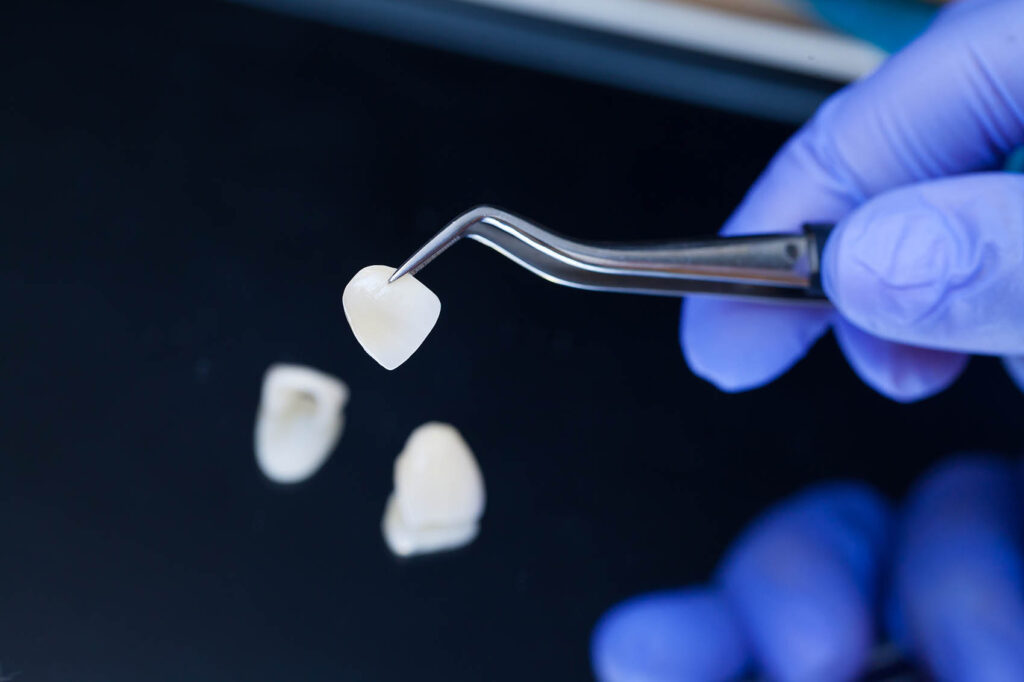Veneers have become a popular choice in cosmetic dentistry over the years, offering both durability and a custom smile that you won’t be able to wipe off your face. Made from porcelain or ceramic, these thin shells are designed to cover imperfections and enhance the appearance of your teeth. However, just like natural teeth, they require proper care. Maintaining the shine and health of your veneers is crucial for their longevity. This guide provides practical advice on cleaning and caring for your veneers, ensuring they remain in top condition for years to come. From daily cleaning habits to professional recommendations, we’ll cover the essentials of veneer maintenance.
How to Clean Porcelain Veneers
Porcelain veneers, while known for being robust and stain-resistant, still require plenty of care to keep them in top condition and to ensure they last for decades to come. By being selective about the products you use on your veneers, and how frequently you use them, you can increase their lifespan and keep their shine. Let’s dive into the recommended practices for cleaning porcelain veneers.
If you use a manual toothbrush: Use a Soft-Bristle Toothbrush to Brush Your Veneers
First thing is first: do you have to brush veneers? The answer is a resounding yes! Just like your natural teeth, veneers need the same level of care. The toothbrush you use is also important when it comes to veneer care. Soft-bristled toothbrushes are the go-to, as their gentle bristles effectively remove plaque and debris without too much extra pressure on the veneers. Hard or medium-bristled brushes can cause tiny scratches on the veneer surface, which over time can compromise their shine. Make sure you replace your toothbrush every three months, or sooner if the bristles appear frayed.
Use a Non-Abrasive Toothpaste
While veneers are resistant to staining, they can be susceptible to abrasion. It’s essential to choose a toothpaste that’s gentle on veneers to work with your soft-bristled toothbrush. Avoid toothpastes with abrasive ingredients which are most toothpastes that market themselves at whitening toothpastes. Instead, opt for toothpastes that are specifically for sensitive teeth, as they tend to be more veneer-friendly and their formulations are better quality.
Use an electric toothbrush and interdental brushes
- use electronic toothbrush as it cleans better than a manual toothbrush. Using electric toothbrush takes the guesswork out of how hard or soft you are brushing. Opt for an electric toothbrush whose head rotates round and round rather than one that vibrates side to side.
- Don’t use floss. Instead use interdental brushes as they will do a better job at cleaning in between the veneers and it’s a much easier habit to get into.
Use an Alcohol-Free Mouthwash Every Time You Brush
- Also avoid using mouthwash as quite often the pH may be too acidic
Alcohol-based mouthwashes can weaken the bonding agents used to adhere veneers to natural teeth. Over time, this can lead to the veneers becoming loose or even detaching. Choose alcohol-free mouthwashes, which are gentle yet effective in getting rid of bacteria and freshening the breath without compromising your veneers.
Daily Care Routine for Veneers
Maintaining the pristine appearance and structural integrity of your veneers is an ongoing commitment. While porcelain veneers are renowned for their durability and resistance to staining, they are not entirely maintenance-free. Just like your natural teeth, they require some daily TLC. Here’s the essential steps in a daily veneer care routine that will have you grinning from ear to ear.
Choosing the Right Tools for Cleaning Veneers
Your toolkit for veneer maintenance should be put together thoughtfully. As previously mentioned, a soft-bristled toothbrush is essential to prevent any potential abrasion, along with a sensitive toothpaste that is gentle on your teeth and gums.
Take your dental care a step further and consider investing in interdental brushes or water flossers. These tools can be particularly effective in cleaning those hard-to-reach areas around veneers, ensuring that no plaque or bacteria can build up over time and cause problems.
Brushing Techniques for Veneers
Brushing is a cornerstone of veneer maintenance. Aim to brush at least twice a day, preferably after meals. Grab your soft-bristled toothbrush and non-abrasive toothpaste and work in gentle, circular motions, ensuring all surfaces of the veneers are adequately cleaned. Spending a minimum of two minutes on brushing ensures thorough cleaning without rushing. The key: take your time.
Flossing and Interdental Cleaning with Veneers
While veneers are resistant to decay, the natural teeth beneath them and the surrounding gum tissue are not. Flossing daily is crucial to prevent the build-up of plaque and tartar between teeth and along the gum line. When flossing around veneers, be gentle and avoid putting too much pressure on the edges.
Using Mouthwash for Veneer Maintenance
Adding an alcohol-free mouthwash into your daily routine can be very beneficial. It helps in eliminating bacteria, especially in areas that brushing or flossing might miss. Swish the mouthwash for about 30 seconds to a minute, ensuring it covers your whole mouth to have the full effect.
Recommended Dental Products for Cleaning Veneers
Supermarket shelves are stocked full of different brands all offering up the best care for your teeth. But not all are suitable for veneers. Look for products that carry the seal of approval from reputable dental associations to help you make the right choice.
Professional Cleaning and Maintenance of Veneers
In addition to your daily routine, regular visits to your dentist are important. Schedule a professional cleaning every six months to ensure that any potential issues are identified and addressed early. Your dentist can also provide tailored advice and recommendations based on the condition and age of your veneers.
Tips for Long-Term Veneer Care
Beyond the daily routine, be mindful of habits that can put your veneers at risk. Avoid using your teeth as tools, biting into hard foods, or chewing on hard objects like pens (a habit many of us have!). If you’re a night-time teeth grinder, discuss potential solutions, like a night guard, with your dentist.
Book a Veneers Consult
Wondering if dental veneers are right for you? Head over to our gallery to check out some incredible transformations with dental veneers. At Dental + Skin Clinic, our team of experienced dental professionals will guide you through the veneer process, ensuring you have a clear understanding of what to expect. From assessing the suitability of top and bottom teeth veneers to discussing the design, shade, and fit, we provide all the answers.
Ready to take the first step towards a brighter, more confident smile? Book your veneers consultation with Dental + Skin Clinic today and let us guide you.





